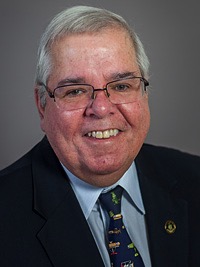At a packed meeting of the Portsmouth High School parent organization last night in the library, Principal Joseph Amaral tried to allay parent fears about security and appeared to modify his position on allowing students to participate in a walkout next Wednesday, March 14. The first half of the two-hour meeting was led by district security coordinator Allan Garcia, then he and Amaral fielded questions from an audience of parents who expressed significant frustration with communications from the school.
One pressing question on the minds of many attendees was what was happening next Wednesday.
“So they’re talking about a walkout," one parent asked. "And I know you guys are anti-walkout, but having a conversation that’s student-led, which is what these kids want to do with this walkout, personally I think it’s a good idea.”
Garcia seemed as confused as some parents. "Anti walkout? Are we pro-walkout or anti-walkout?" He looked to Amaral.
Amaral responded, “We’re doing a walkout with all the students on March 14th to the new gym. Some students already came to me and said ‘I don’t want to be a part of that,’ so there are going to be options for those students to go somewhere else. The walkout to the new gym is working with the Student Council leadership. I’ve met with them at least three times already to ask what they need, how they want to work it, how they want to construct it, and there are students who would prefer to walk to the track. And what I’m trying to do is accommodate, and be sure that they’re safe throughout.”
That led to another parent commenting, “Okay, this is another example of communication that’s a little bit awry. Because the e-mail that I received says that you can’t do it. It’s not safe. So please, the overarching thing here: more words in the e-mail. Maybe more frequent e-mails. [If we had that]I think maybe half the people wouldn’t even be here.”
“We’re going to try to honor everyone’s preference to make sure that there is support," Amaral continued. "And I think that’s probably more generous than a lot of districts, other high schools that I’ve talked to in the last two days.”
That seemed like a shift in message to some parents. “I left that communication thinking that if they go down there, they’re liable to be suspended,” said one. “And that’s what they think, too,” another added.
Amaral attempted to explain his e-mail. “I think that the communication indicated that we’re going to have an assembly, and we’re going to do that, I’m still working with the Superintendent in terms of the consequence, because we have a policy in place. But I also feel this is an extraordinary event. What we don’t want to do is create a precedent. Because there will be situations where students will want to manifest their opinions in ways that are sometimes positive, sometimes negative. Suppose a student gets suspended and they want to protest that student suspension. I don’t know if that’s necessarily a good idea. Especially when they leave. I’m still concerned. I have to be sure we protect those kids from doing stupid things. Getting out, getting into trouble.”
Approached for clarification after the meeting, Amaral had this exchange with a reporter:
Amaral: “What I don’t want to have happen is kids shaming other kids, making other kids feel bad. That’s why I’m offering all these things. Because as many kids as we know want to be involved in either the gym walkout or the track, kids have come to me and said, I don’t want to do this. And I want to honor those kids too. It’s not like it’s a unifying...I wish it was more unifying...but every kid comes from a different place. And I’m working with the Superintendent to make sure that because of the extraordinary effect of what’s happening nationally, with the students, and the things that we’ve been going through here, to be as flexible as possible.”
Reporter: “What was in that memo that said that people were going to be suspended...”
Amaral: “The policy was reiterated. That was not in the original memo. I’ll just say that.”
Reporter: “So that’s not operational now? If students walk to the track, if they take that option, will they be suspended?”
Amaral: “No.”
Reporter: “Okay.”
Amaral: “Is it possible because we have, because we have rules, is it possible that they will have to meet with me and have a deterrment, you know, say, hey, you did this, but it doesn’t mean that next week you do another walkout because you don’t like the lunch food.”
The clarity of communications from PHS was a major theme, as parents peppered Amaral with questions for most of the second hour of the meeting.
“My kids don’t feel safe here," one parent said. "The e-mail and the communication that has been given from the school — they’re inadequate.” [This received a round of applause from attendees] And to send an e-mail out to say that that child — and he needs help, to bring a weapon to school, you either feel like you need to defend yourself or you want to hurt something, either way, you’re reaching out and you need help — and to say that child had no intent to do anything is ridiculous, to even send that statement out. I feel like this was a great presentation, there was a lot of talking on your part, and fine, [but] I don’t think we’re really addressing anyone here. [Security measures that were discussed] I want to see that. But what are we doing...how can my kids feel safe tomorrow. Because they don’t.”
“The kids are afraid," said another parent. "They have real reason to be afraid. There was an intruder with a knife that came into their place. And hurt a teacher. In front of them. So, yeah, we’re uptight because of the Florida shooting, but we were attacked here. These kids were attacked here. A teacher was attacked. They need help. The kids in this school need help. And I don’t know when that’s coming.”
“Something bad is happening and I think a joint communication from the administration and the police department to the parents is absolutely, positively, a necessity," another parent added. "[We need you] To say, ‘we’re on everything.’ We’re giving them all this information [that] it’s going to be okay, but if they don’t see you, Principal Amaral, and the police chief stand together united saying, ‘we’re chasing, we’re following, all these things that are going on in this community, we’re on it. We’re the professionals.’ They need that. They need it badly. So support us as parents, and do your job. Stand up in front our kids. Look them in the eye. Old school communication. Pull them in a room. Get together. Side by side. And say, ‘This sucks. This is tough. But we got you. We’re going to do everything within our power to protect you.’ They need you guys to do that.”
One parent raised the issue of getting professional help to assist the schools with structuring their messages. “Do you have a crisis communications consultant?" they asked. "Because if you don’t that’s the person you probably need most. [T]here are ways to communicate confidence. I’ll give you just one example. The phrase, ‘we found no evidence to,’ repeated many times in the communications. As we all know, Snapchat is virtually untraceable. So telling us you found no evidence of something is poorly phrased. And I mean that in a very constructive way. There are things you’re trying to communicate that a good crisis communications professional might help you with. And I do think that a more rapid response mechanism for the school system, with communications, would help damp down the social media.”
Another parent stressed the importance of involving the students. “At this point, you have a real credibility issue," the parent said. "So what you need to think about doing is whatever you construct in terms of this crisis communications, [you need to] get student leadership to partner with you. To disseminate that good information. So that all the students are talking to each other and spreading good information that’s positive. And that might get your credibility back.”
This reporter followed up on another concern that had been raised by the wording of the initial memo from PHS. This reporter had sent an e-mail to the Superintendent, principal, and school committee, copying in the RI ACLU, questioning what appeared to be an attempt to limit student expression in last week's e-mail from the school.
Reporter: "To be clear, you’re going to allow the students to determine the content of what they do on that day?
Amaral: "That was never a question."
Reporter: "That was a question based on how it was written in the e-mail."
Amaral: "The students are the ones that are creating...if you you notice the e-mail, it was written by myself and the students. They approved...every single student that was in the leadership of the executive council approved that statement. And that statement was done from the conversations that we’ve had about how we’re going to move forward as a school and how we can do it in a safe fashion. The content is something that the students are going to have to determine, and that’s one of the things that’s in progress right now. They’re going to determine what the fashion of the meeting is going to be like. Are they going to do the 17 minutes of the moment of silence, are they going to have songs and a tribute from their peers, those are the things that they’re determining. I’m not going to edit them any more than anyone else here. As long as it’s not disrespectful or hurtful to another student. That was the purpose. Nothing in that e-mail that I saw indicated that I saw indicated that we were trying to sanction or subvert student messages. That was something that...you can interpret that, but that’s not the message.”
After the meeting, this reporter followed up.
Reporter: “I apologize if I misinterpreted what was in that e-mail, that was just how I read it.”
Amaral: “I understand. But there was more information to come. I have to give the students a chance to meet. Today was the earliest we could meet, with the Student Council. I gave them until Monday to come back. And I don’t know, other than, individually, some kids saying that I’m going to do that walk to the track, [there has been] no leadership from that area has come to me and said, ‘I want to do this.’ If they had come to me before, I could have said, look, let’s do a sign-up sheet, do something, so I know who’s going, so I know how many people to assign there. None of that happened. I had to go to student leadership to say, look, this is important, we should do it, just the opposite of what you stated in your e-mail is happening. I approached student leadership and said, look guys, this I think is important to do, what do you think you should do. And then they debated it, and they took it to Student Council general membership, which is elected by the student body, and then they came back to me. Today was our third time meeting to come up with a plan that they want to entertain. It’s not about censorship.”
Reporter: “Then the e-mail could have been written a bit better, because that is what that e-mail said. That recommendation for a crisis comms person, that’s a real job.”
Amaral: “I’ve never heard of that, but I will mention it to the Superintendent. [...] That was one of the things that Sue Lusi said that we needed in our district, and we still need that communication piece, maybe that’s something that the Superintendent will put forward in future budgets.”
You'll notice that nothing from the first hour of the meeting is described in this reporting. The following exchange with Garcia took place at the beginning of the event, after he told a student with a video camera to turn it off and not record the proceedings.
Garcia: "Anybody here with the media? (Reporter raises hand) Okay, and what are you going to do with the information I provide today?"
Reporter: "That depends."
Garcia:" I just, and, uh, no offense, I cannot give away the playbook, obviously, to some of the safeguards we have here. So..."
Reporter: "But you’re going to discuss it with parents openly?"
Garcia: "Uh, yeah."
Reporter: "Okay."
Garcia: "I just...do you understand that I don’t want this published in any type of periodicals about certain capabilities of certain things because it would, you know, if somebody’s reading it that shouldn’t be reading it, you know, it could be a bad thing."
Reporter: "You realize that’s prior restraint."
Garcia: "Okay. You call it what you want."
To be clear: If there was anything in the first hour of the meeting that deserved to be reported, I would have included it here. And the district's safety consultant needs to understand the implications of government attempts at suppression of press freedom. When a government official speaks at an event at which the general public is present, there is no expectation of confidentiality. Prior restraint exceptions need to be narrowly scoped. Much of what he said in that first hour had no security implications whatsoever, and his request of this reporter — and demand that a student not record — was, in my opinion, inappropriate.
 The Rhode Island Foundation is offering grants and scholarships through the Miss Swinburne Fund. Female students from Newport County and nonprofits that support the self-sufficiency and independence of Newport County girls and women have until April 6 to apply.
The Rhode Island Foundation is offering grants and scholarships through the Miss Swinburne Fund. Female students from Newport County and nonprofits that support the self-sufficiency and independence of Newport County girls and women have until April 6 to apply. The Aquidneck Island Planning Commission (AIPC) Board of Directors announced the appointment of John F. Shea as Executive Director in a statement to media this afternoon. The AIPC said, "John Shea brings expertise in a wide array of policy areas, non-profit management, and addressing concerns at a regional-scale."
The Aquidneck Island Planning Commission (AIPC) Board of Directors announced the appointment of John F. Shea as Executive Director in a statement to media this afternoon. The AIPC said, "John Shea brings expertise in a wide array of policy areas, non-profit management, and addressing concerns at a regional-scale."
 The Rhode Island Democratic Women’s Caucus announced the results of their first elected board of directors Tuesday morning, and according to a news release, Portsmouth's Michelle McGaw and Daniela Abbott were voted into leadership positions.
The Rhode Island Democratic Women’s Caucus announced the results of their first elected board of directors Tuesday morning, and according to a news release, Portsmouth's Michelle McGaw and Daniela Abbott were voted into leadership positions. I love it when my constituents provide input on issues. The PawSox stadium has brought many emails and calls from both sides of the bench. Many have argued about the economic importance of the PawSox to our state. I’ve sat through many, many hours of testimony in the House Finance Committee and asked many questions. Now that the bill has been sent to the House, my committee will have more hearings, during which I’m confident we can continue to improve the proposal and make it a better deal for taxpayers.
I love it when my constituents provide input on issues. The PawSox stadium has brought many emails and calls from both sides of the bench. Many have argued about the economic importance of the PawSox to our state. I’ve sat through many, many hours of testimony in the House Finance Committee and asked many questions. Now that the bill has been sent to the House, my committee will have more hearings, during which I’m confident we can continue to improve the proposal and make it a better deal for taxpayers. Sen. James A. Seveney (D-11) has introduced legislation that would ban ‘bump stocks’ on semi-automatic firearms.
Sen. James A. Seveney (D-11) has introduced legislation that would ban ‘bump stocks’ on semi-automatic firearms. At its regular monthly meeting on Saturday, September 16th, the Prudence Island Water District Board adopted a budget for fiscal year '18 which begins on October 1st, according to an announcement sent to local media.
At its regular monthly meeting on Saturday, September 16th, the Prudence Island Water District Board adopted a budget for fiscal year '18 which begins on October 1st, according to an announcement sent to local media.